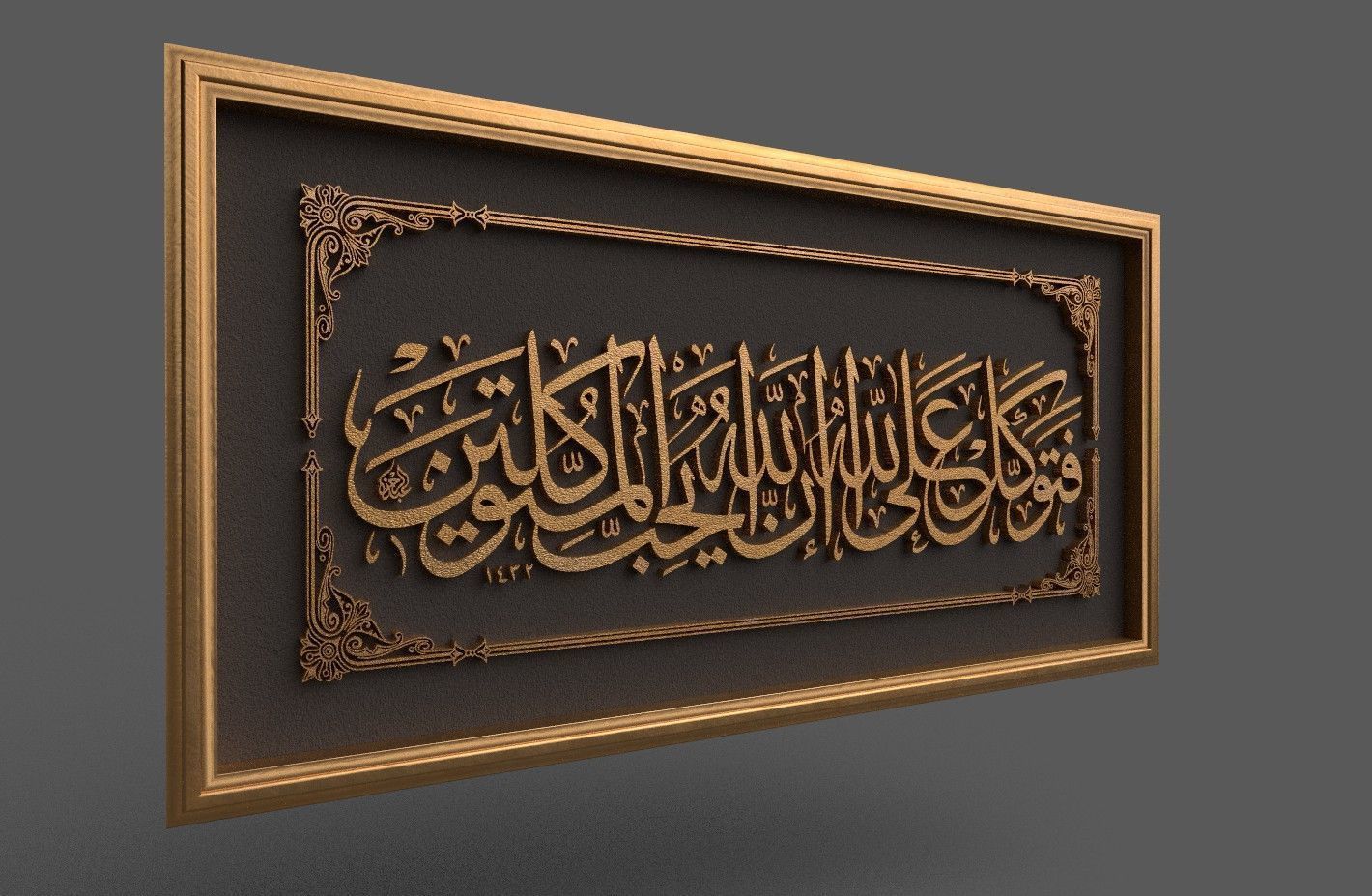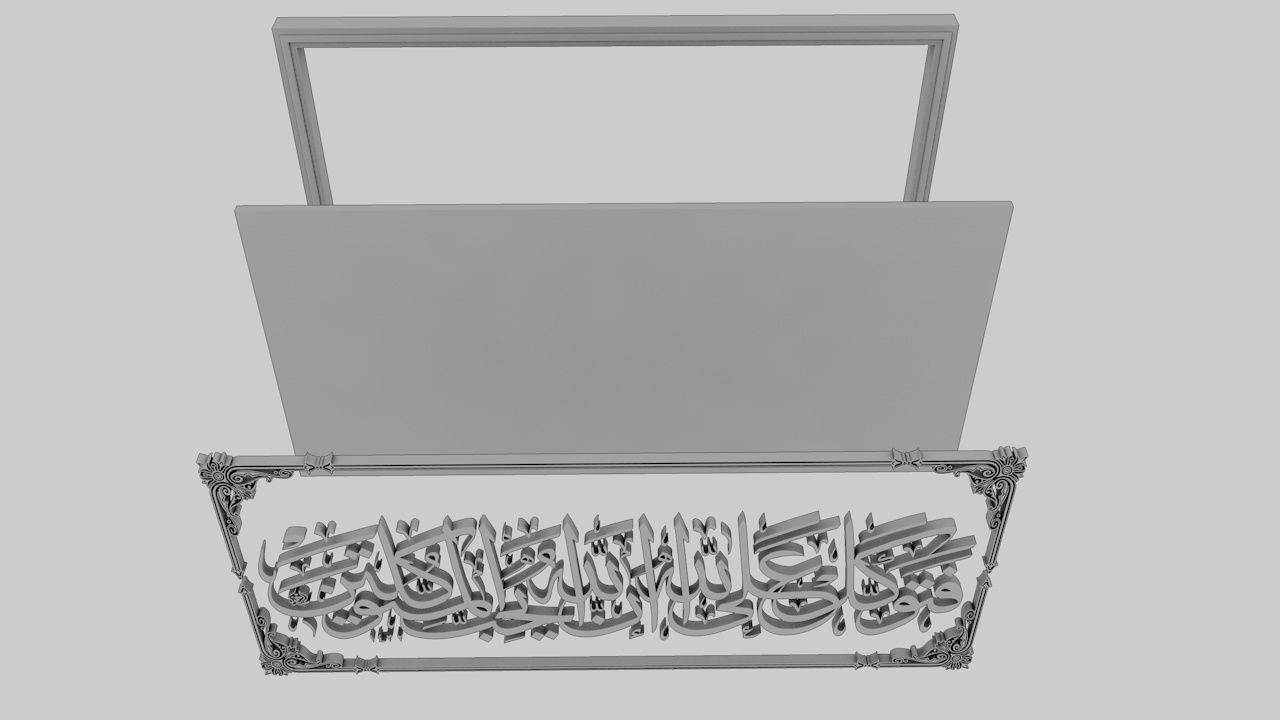
quran verse 3D print model 3D model
quran verse 3D print modelThe Quran,[c] also romanized Qur'an or Koran,[d] is the central religious text of Islam, believed by Muslims to be a revelation directly from God (Allāh). It is organized in 114 chapters (surah, pl. suwer) which consist of individual verses (āyah). Besides its religious significance, it is widely regarded as the finest work in Arabic literature,[11][12][13] and has significantly influenced the Arabic language. It is the object of a modern field of academic research known as Quranic studies.
Muslims believe the Quran was orally revealed by God to the final Islamic prophet Muhammad through the angel Gabriel incrementally over a period of some 23 years, beginning on the Night of Power, when Muhammad was 40, and concluding in 632, the year of his death. Muslims regard the Quran as Muhammad's most important miracle, a proof of his prophethood, and the culmination of a series of divine messages starting with those revealed to the first Islamic prophet Adam, including the Islamic holy books of the Torah, Psalms, and Gospel.
The Quran is believed by Muslims to be God's own divine speech providing a complete code of conduct across all facets of life. This has led Muslim theologians to fiercely debate whether the Quran was created or uncreated. According to tradition, several of Muhammad's companions served as scribes, recording the revelations. Shortly after Muhammad's death, the Quran was compiled on the order of the first caliph Abu Bakr (r. 632–634) by the companions, who had written down or memorized parts of it. Caliph Uthman (r. 644–656) established a standard version, now known as the Uthmanic codex, which is generally considered the archetype of the Quran known today. There are, however, variant readings, with some differences in meaning.
The Quran assumes the reader's familiarity with major narratives recounted in the Biblical and apocryphal texts. It summarizes some, dwells at length on others and, in some cases, presents alternative accounts and interpretations of events. The Quran describes itself as a book of guidance for humankind (2:185). It sometimes offers detailed accounts of specific historical events, and it often emphasizes the moral significance of an event over its narrative sequence.
Supplementing the Quran with explanations for some cryptic Quranic narratives, and rulings that also provide the basis for Islamic law in most denominations of Islam, are hadiths—oral and written traditions believed to describe words and actions of Muhammad. During prayers, the Quran is recited only in Arabic. Someone who has memorized the entire Quran is called a hafiz. Ideally, verses are recited with a special kind of prosody reserved for this purpose called tajwid. During the month of Ramadan, Muslims typically complete the recitation of the whole Quran during tarawih prayers. In order to extrapolate the meaning of a particular Quranic verse, Muslims rely on exegesis, or commentary rather than a direct translation of the text.
QuranHistoryWaḥy First revelationAsbab al-NuzulHistoricityManuscriptsSamarkand Kufic QuranSanaa manuscriptTopkapi manuscriptBirmingham manuscriptDivisionsSurah ListMeccanMedinanĀyahJuz'Muqatta'atContentProphetsWomenAnimalsLegendsMiraclesParablesScienceEschatologyGodReadingQāriʾHifzTajwidTarteelAhrufQira'atTranslationsList EnglishAhmadiyyaExegesisListHermeneuticsEsotericismAbrogationBiblical parallelsRelated persons Mentioned by nameCharacteristicsI'jazInerrancyRelatedCriticismQuran and SunnahQuranismShi’a viewCategoryIslam portalvteEtymology and meaningThe word qur'ān appears about 70 times in the Quran itself,[14] assuming various meanings. It is a verbal noun (maṣdar) of the Arabic verb qara'a (قرأ) meaning 'he read' or 'he recited'. The Syriac equivalent is qeryānā (ܩܪܝܢܐ), which refers to 'scripture reading' or 'lesson'.[15] While some Western scholars consider the word to be derived from the Syriac, the majority of Muslim authorities hold the origin of the word is qara'a itself.[16] Regardless, it had become an Arabic term by Muhammad's lifetime.[16] An important meaning of the word is the 'act of reciting', as reflected in an early Quranic passage: It is for Us to collect it and to recite it (qur'ānahu).[17]
In other verses, the word refers to 'an individual passage recited [by Muhammad]'. Its liturgical context is seen in a number of passages, for example: So when al-qur'ān is recited, listen to it and keep silent.[18] The word may also assume the meaning of a codified scripture when mentioned with other scriptures such as the Torah and Gospel.[19]
The term also has closely related synonyms that are employed throughout the Quran. Each synonym possesses its own distinct meaning, but its use may converge with that of qur'ān in certain contexts. Such terms include kitāb ('book'), āyah ('sign'), and sūrah ('scripture'); the latter two terms also denote units of revelation. In the large majority of contexts, usually with a definite article (al-), the word is referred to as the waḥy ('revelation'), that which has been sent down (tanzīl) at intervals.[20][21] Other related words include: dhikr ('remembrance'), used to refer to the Quran in the sense of a reminder and warning; and ḥikmah ('wisdom'), sometimes referring to the revelation or part of it.[16][e]
The Quran describes itself as 'the discernment' (al-furqān), 'the mother book' (umm al-kitāb), 'the guide' (huda), 'the wisdom' (hikmah), 'the remembrance' (dhikr), and 'the revelation' (tanzīl; 'something sent down', signifying the descent of an object from a higher place to lower place).[22] Another term is al-kitāb ('The Book'), though it is also used in the Arabic language for other scriptures, such as the Torah and the Gospels. The term mus'haf ('written work') is often used to refer to particular Quranic manuscripts but is also used in the Quran to identify earlier revealed books.[16]Prophetic eraIslamic tradition relates that Muhammad received his first revelation in 610 CE in the Cave of Hira on the Night of Power[23] during one of his isolated retreats to the mountains. Thereafter, he received revelations over a period of 23 years. According to hadith (traditions ascribed to Muhammad)[f][24] and Muslim history, after Muhammad and his followers immigrated to Medina and formed an independent Muslim community, he ordered many of his companions to recite the Quran and to learn and teach the laws, which were revealed daily. It is related that some of the Quraysh who were taken prisoners at the Battle of Badr regained their freedom after they had taught some of the Muslims the simple writing of the time. Thus a group of Muslims gradually became literate. As it was initially spoken, the Quran was recorded on tablets, bones, and the wide, flat ends of date palm fronds. Most suras (also usually transliterated as Surah) were in use amongst early Muslims since they are mentioned in numerous sayings by both Sunni and Shia sources, relating Muhammad's use of the Quran as a call to Islam, the making of prayer and the manner of recitation. However, the Quran did not exist in book form at the time of Muhammad's death in 632 at age 61–62.[16][25][26][27][28][29] There is agreement among scholars that Muhammad himself did not write down the revelation.[30]
Traditionally believed to be Muhammad's first revelation, Sura Al-Alaq, later placed 96th in the Quranic regulations, in current writing styleSahih al-Bukhari narrates Muhammad describing the revelations as, Sometimes it is (revealed) like the ringing of a bell and A'isha reported, I saw the Prophet being inspired Divinely on a very cold day and noticed the sweat dropping from his forehead (as the Inspiration was over).[g] Muhammad's first revelation, according to the Quran, was accompanied with a vision. The agent of revelation is mentioned as the one mighty in power,[32] the one who grew clear to view when he was on the uppermost horizon. Then he drew nigh and came down till he was (distant) two bows' length or even nearer.[28][33] The Islamic studies scholar Welch states in the Encyclopaedia of Islam that he believes the graphic descriptions of Muhammad's condition at these moments may be regarded as genuine, because he was severely disturbed after these revelations. According to Welch, these seizures would have been seen by those around him as convincing evidence for the superhuman origin of Muhammad's inspirations. However, Muhammad's critics accused him of being a possessed man, a soothsayer, or a magician since his experiences were similar to those claimed by such figures well known in ancient Arabia. Welch additionally states that it remains uncertain whether these experiences occurred before or after Muhammad's initial claim of prophethood.[34]
The Quran describes Muhammad as ummi,[35] which is traditionally interpreted as 'illiterate', but the meaning is rather more complex. Medieval commentators such as al-Tabari (d. 923) maintained that the term induced two meanings: first, the inability to read or write in general; second, the inexperience or ignorance of the previous books or scriptures (but they gave priority to the first meaning). Muhammad's illiteracy was taken as a sign of the genuineness of his prophethood. For example, according to Fakhr al-Din al-Razi, if Muhammad had mastered writing and reading he possibly would have been suspected of having studied the books of the ancestors. Some scholars such as W. Montgomery Watt prefer the second meaning of ummi—they take it to indicate unfamiliarity with earlier sacred texts.[28][36]
The final verse of the Quran was revealed on the 18th of the Islamic month of Dhu al-Hijjah in the year 10 A.H., a date that roughly corresponds to February or March 632. The verse was revealed after the Prophet finished delivering his sermon at Ghadir Khumm.


























